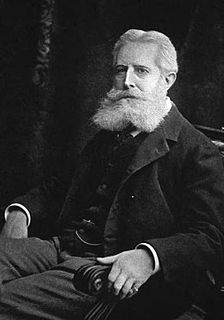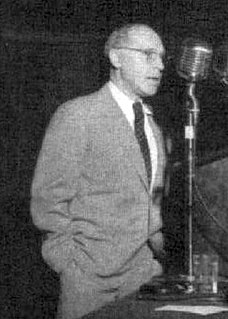A Quote by Edmund Clarence Stedman
A critic must accept what is best in a poet, and thus become his best encourager.
Related Quotes
As science is more and more subject to grave misuse as well as to use for human benefit it has also become the scientist's responsibility to become aware of the social relations and applications of his subject, and to exert his influence in such a direction as will result in the best applications of the findings in his own and related fields. Thus he must help in educating the public, in the broad sense, and this means first educating himself, not only in science but in regard to the great issues confronting mankind today.
The best athlete wants his opponent at his best. The best general enters the mind of his enemy. The best businessman serves the communal good. The best leader follows the will of the people. All of the embody the virtue of non-competition. Not that they don't love to compete, but they do it in the spirit of play. In this they are like children and in harmony with the Tao.
One of the best and most challenging books about Orwell is by the socialist literary critic Raymond Williams. As a critic - and, in some ways, as a figure, at least within the academy - Williams was what England had in the generation after Orwell, and toward the end of his life, he became more critical of his predecessor.
No man can do both effective and decent work in public life unless he is a practical politician on the one hand, and a sturdy believer in Sunday-school politics on the other. He must always strive manfully for the best, and yet, like Abraham Lincoln, must often resign himself to accept the best possible.
There is no reason for you to try to become like white people and there is no basis whatever for their impertinent assumption that *they* must accept *you*. The really terrible thing, old buddy, is that you must accept them. And I mean that very seriously. You must accept them and accept them with love.
He who, in an enlightened and literary society, aspires to be a great poet, must first become a little child. He must take to pieces the whole web of his mind. He must unlearn much of that knowledge which has perhaps constituted hitherto his chief title to superiority. His very talents will be a hindrance to him.
So, then, the best of the historian is subject to the poet; for whatsoever action or faction, whatsoever counsel, policy, or war-stratagem the historian is bound to recite, that may the poet, if he list, with his imitation make his own, beautifying it both for further teaching and more delighting, as it pleaseth him; having all, from Dante’s Heaven to his Hell, under the authority of his pen.
The story of Sherlock Holmes, on the surface, is about detection, but in reality, it's about the best of two men who save each other - a lost, washed-up war hero and a man who could end up committing murders instead of solving them. They come together. They become this perfect unit. They become the best friendship ever, and they become heroes. That's what we fall in love with, not Sherlock on his own. No one can love that man on his own, but Sherlock Holmes and Dr. Watson - the best friends ever.







































